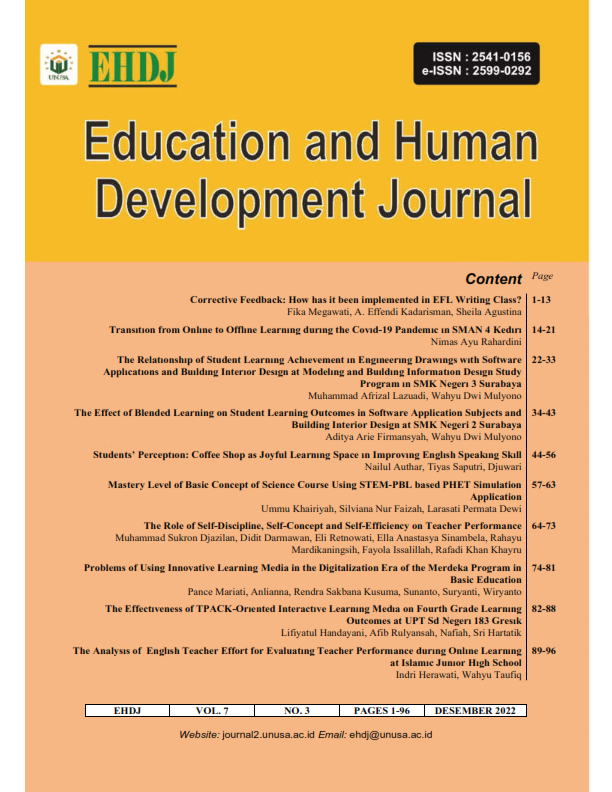Transition from Online to Offline Learing during the Covid-19 Pandemic in SMAN 4 Kediri
##plugins.themes.bootstrap3.article.main##
Abstract
During pandemic covid 19, students in different schools will face different problems in adapting the transition from online to offline learning. However, each school or class has different characteristics and obstacles. Therefore, this study would like to observe one of senior high schools in Kediri, East Java to find out the obstacles that could be found by the teachers and students based on teachers’ perception and classroom observation. The researcher used a qualitative descriptive approach in this study. The results show that the main problem is the students’ motivation in learning English. Besides, students’ condition at home and the use of gadgets during online learning also influence the students’ learning process even until the offline class is implemented again. The researcher also provides the recommendation strategy from some other studies to solve this kind of problem based on the observation and teacher’s interview. Considering, students’ intrinsic and extrinsic motivation in learning English are recommended. Gamification can be a good method to increase students’ motivation during the learning process.
Downloads
##plugins.themes.bootstrap3.article.details##
Copyright (c) 2022 Nimas Ayu Rahardini

This work is licensed under a Creative Commons Attribution-ShareAlike 4.0 International License.
References
Cheung, A. (2021). Synchronous online teaching, a blessing or a curse? Insights from EFL primary students’ interaction during online English lessons. System, 100(June), 102566. https://doi.org/10.1016/j.system.2021.102566 DOI: https://doi.org/10.1016/j.system.2021.102566
Esquivel Vera, F., Figueredo Camé, M. N., & Canese, V. (2021). Gamification in the English Classroom: An Action Research on How it Might Impact on Students’ Motivation and Engagement. ÑEMITỸRÃ: Revista Multilingüe de Lengüa, Sociedad y Educación, 5. https://doi.org/10.47133/nemityra2021107 DOI: https://doi.org/10.47133/NEMITYRA2021107
Han, Y., & Yin, W. (2021). The effect of multimedia teaching platform based on virtual technology on students’ English learning motivation. International Journal of Electrical Engineering Education. https://doi.org/10.1177/0020720920988495 DOI: https://doi.org/10.1177/0020720920988495
Klimova, B. (2021). An insight into online foreign language learning and teaching in the era of COVID-19 pandemic. Procedia Computer Science, 192, 1787–1794. https://doi.org/10.1016/j.procs.2021.08.183 DOI: https://doi.org/10.1016/j.procs.2021.08.183
Lemay, D. J., Bazelais, P., & Doleck, T. (2021). Transition to online learning during the COVID-19 pandemic. Computers in Human Behavior Reports, 4, 100130. https://doi.org/10.1016/j.chbr.2021.100130 DOI: https://doi.org/10.1016/j.chbr.2021.100130
Liu, I. F. (2017). An Exploration Based on Intrinsic, Extrinsic, and Interpersonal Motivation That Affect Learners’ Intention to Participate in an English Reading Contest. Journal of Educational Computing Research, 55(5), 699–723. https://doi.org/10.1177/0735633116682340 DOI: https://doi.org/10.1177/0735633116682340
Nassaji, H. (2015). Qualitative and descriptive research: Data type versus data analysis. Language Teaching Research, 19(2), 129–132. https://doi.org/10.1177/1362168815572747 DOI: https://doi.org/10.1177/1362168815572747
Teng, M. F., Wang, C., & Wu, J. G. (2021). Metacognitive Strategies, Language Learning Motivation, Self-Efficacy Belief, and English Achievement During Remote Learning: A Structural Equation Modelling Approach. RELC Journal. https://doi.org/10.1177/00336882211040268 DOI: https://doi.org/10.31234/osf.io/epm6s

